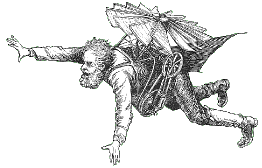| Gothic Steam Phantastic > Information > Who is afraid of steam? |
 Who is afraid of steam? |
 |
| -*- Home -*- Daleth-*- I&I RPG -*- Information -*- Forum -*- Credits -*- Links -*- |
|
I have observed the lands of steampunk, I roamed the streets of Gotham and Arkham (and the Inner City of Amsterdam, for that matter), I have seen many realms of the unknown and the phantastic, I wandered the edged of imagination. And I noticed something that struck me in a strange way. It is called technics, modern technics. As we gaze upon the roots of the here featured genres, we see the literature of the 19th century. The technics of that age where amazing, a ticket to the future. Of course, things could go wrong, but mostly technics were something to encounter with joy and excitement. As we walk into the 20th century, we see that technics not only hold a promise for the future, but are also something to be afraid of - very afraid. People in real life fear modern technics, are terrified for things like computers; in fiction computers and other sensible things go insane and try to take over the world. What struck me is that in the age of the steam engine the fear for machines was not an ingredient for horror stories. Only as science fiction really took off and made an own genre, the fear for the machines came into the stories. Not that the horror for a scientific future was not present - in a way Mary Shelley's Frankenstein is exactly what fear for scientific experiments is about, but it is not the machines we have to be afraid of, it is the results of the experiments that are terrifying. But nowhere in early horror fiction I can find traces of terror related to the then modern technics. The fears relate to the fear inside, the terror that has been invented with the own mind, or even ghastly things that might happen - death and what is beyond death is what people were afraid of. Is it probably because death is now something that happens to others and is no longer an omnipresent visual threat in our lives? Is slavery to the machines now, in our world of freedom, more feared than before because in the past the labourers where more or less slaves to the factories and this slavery considered something that just was the way it is? What is it that we fear, and what kinds of terror has been in fashion over the centuries? What stays is in my opinion the fear for the unknown and the unexpected. And machines become more and more the unknown; most of us will understand the way a steam engine works, but try the same with computers, the chips, televisions, microwave ovens, the things inside the boxes we use. We don't know how to repair a broken computer or microwave oven, most of us will be able to mend a broken steam engine. A steam engine is a thing you can rely on, computers are just... confusing, scaring, terrifying at times. Watch the peasant in the rural area of the early 19th century. Watch, how he observes the first steam engine he has ever seen in his life. What will he think? The thing might be magic! Evil, ran by demons! Will he be afraid of it, or does it not bother him? For, of course, the steam engine is something that passes his rural life, the machine as such has nothing to do with his life. Things change as the machines have a larger part in daily life. If you have to work together with machines, you have to rely on them, trust them - but can you trust what you do not understand? Modern or steampunk technics in steam fantasies are usually the 19th century amazing machines, and how complicated they might be, not the machines that make the people scared. Which might be a different angle to construct a believable plot of a steam story. © Yaghish 2003 |
| -*-© Steammasters 2003-*- |
| ^ Up |